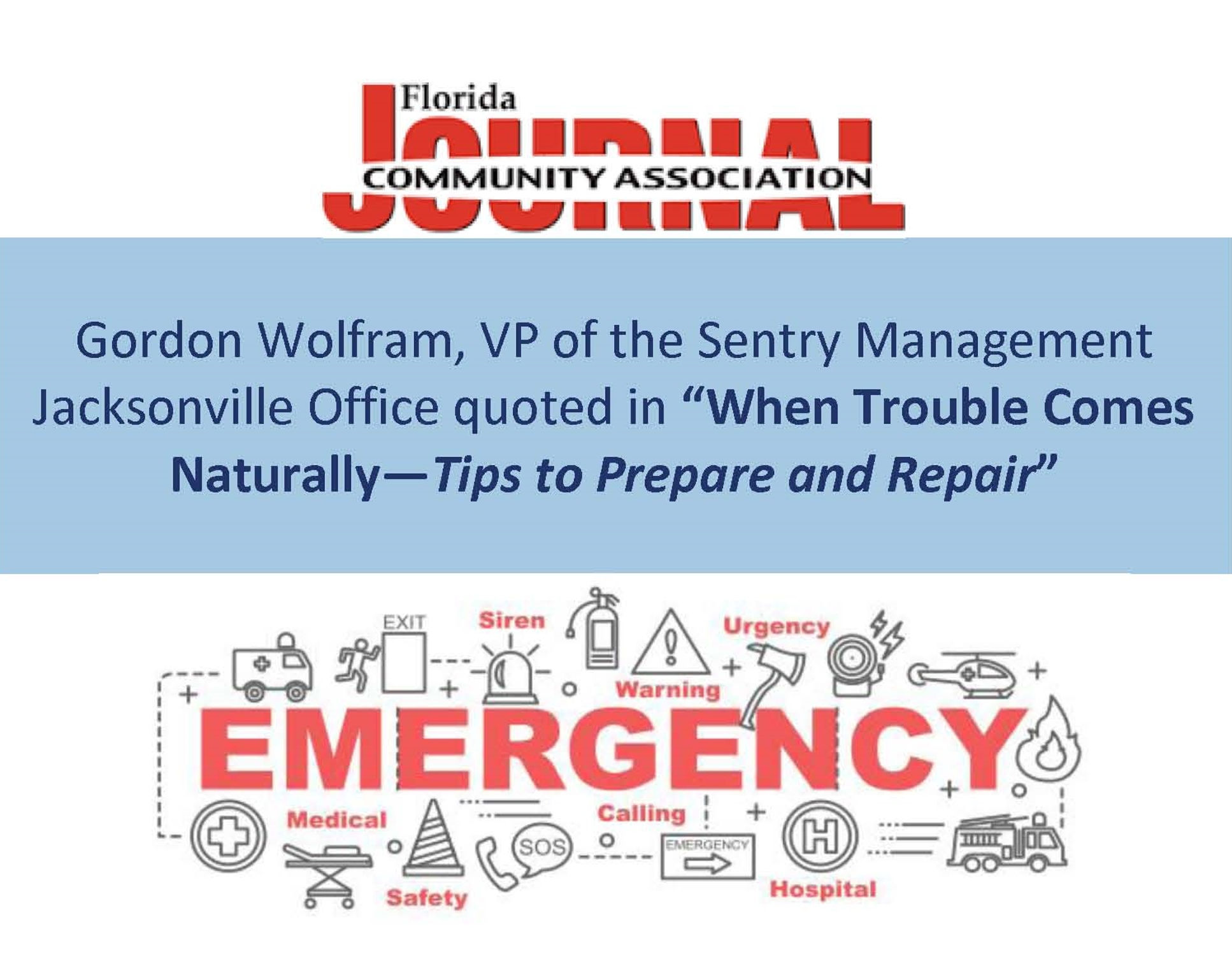

From time to time, Homeowners associations and condominiums suffer physical assault, whether from weather or other natural phenomena. The more attention that is given in advance, the more likely it is that damage may be averted and recovery will proceed smoothly. While hurricanes set the agenda for most disaster planning and provide important procedures that can apply to other situations, it is still important to consider the details of other potential problems.
Gordon Wolfram excerpts from an article in the Florida Community Association Journal:
Mold
Gordon Wolfram with Sentry Management explains, “We’re talking to communities about a lot of little things to prevent mold. You have to keep structures clean. We advise landscape vendors to not mulch up to the sides of buildings and to create slopes so water drains away. Sprinkler heads should be adjusted so they don’t spray the building.”
Wolfram explains, “In one condominium with owners who travel quite a bit, we have plans for maintenance staff to turn off water to water heaters in unoccupied units. That association is paying for replacement of all valves and water supply lines, as well as replacing water heaters based on their age before they fail. The genesis of this was an event with significant damage to adjacent units when a water heater blew. There were mold issues, and even though they had an insurance policy that covered the damage, people were upset and inconvenienced.”
Drought/Temperature Extremes
For extreme heat, Wolfram reminds communities, “Make sure the HVAC for common areas has been serviced and the lines flushed so there is no down time. Similarly, for forecasts of cold weather, check the propane if the community uses gas.”
Extreme conditions may precipitate a power outage, which has its own set of challenges regardless of any heat, storms, or general flurry of activity that may be going on. “We had the primary circuit breaker for an entire high-rise fail,” recalls Wolfram. “The breaker costs over $30,000 and is rare—there were only two available in the country. Within six hours we secured a contractor with a generator truck and fuel tank to run the entire building. It ran 24 hours a day for five days, until we located a breaker and had it installed. The bill for the generator and fuel was $15,000, with $7,000 for the electrician and over $30,000 for the breaker, which insurance paid after the deductible was met. The owners and board
Fire
Wolfram advises, “In condominiums we talk to the residents about the call system and evacuation route to use–when the elevator isn’t working [or is reserved for the fire fighters], the residents must use the stairs. We ensure equipment is inspected, pressure in sprinklers is adequate, and panels are being monitored, so if an event triggers an alarm there will be a short response time. When an alarm is triggered, the air conditioning shuts down so flame and smoke don’t blow through the building, and fire doors close to partition the building.
“The board and management will be calling those residents they haven’t heard from—we want to know if someone is trapped. This is the call system used for hurricanes, as well,” notes Wolfram.
Hurricane
Flooding is only part of the buffet of damage wrought by a hurricane, with its onslaught of wind and water. Preparing for this Florida threat should be a routine part of everyday life, affecting maintenance, renovations, finances, communication, and more.
Wolfram shares, “Hurricane Matthew hit St. Augustine in October 2016, and eight months later we’re just now settling claims for air conditioning units that were compromised.”
“You don’t want to do so much that you jeopardize your insurance claim,” comments Wolfram. “That’s one reason why we do so much photo documentation before and after an event. If we have to move a physical item so it lessens the physical impact of the damage, we have photo evidence.”
“After design repair specifications and drawings are prepared, contractors can be solicited for major reconstruction work, with a licensed professional engineer serving as construction administrator. After Hurricane Charley, we saw many cases where work had to be redone after the insurance company wrote checks for repair work by out-of-state contractors. Those claims against the contractor were very difficult to pursue because they were out of state.”
Wolfram advocates hiring an independent adjuster to deal with insurance claims. “The insurance company’s adjuster is there to minimize what the insurance company pays. I always recommend a second opinion from an independent adjuster. We review the meticulous report on what the company adjuster says about elements damaged, depreciation, replacement costs, and deductibles, and then we negotiate after we compare it to what the independent adjuster says. Sometimes we mention that we may have a supplemental claim for damage discovered later, such as water in an attic.”
CommunityPro® is an easy way to make payments, access association documents, view account history, stay informed and more.